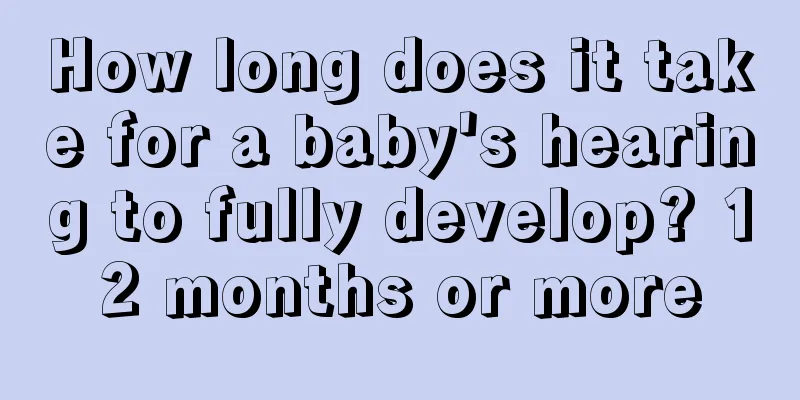How long does it take for a baby's hearing to fully develop? 12 months or more

|
From birth, the various functions of a newborn's body gradually develop and improve. So, how long does it take for a baby's hearing to fully develop? How long does it take for a baby's hearing to fully develop?The baby develops hearing in the mother's womb When the baby is still in the warm womb, at only 8 weeks of pregnancy, the baby's hearing has begun to form. At 24 weeks of pregnancy, hearing development is complete. At 25 weeks, the baby can hear the surrounding sounds in the parents' belly, especially the parents' voices. Therefore, starting from the 25th week of pregnancy, parents can talk more to the baby. The baby's hearing development after birth When children are born into this world, their hearing develops gradually, which can be roughly divided into the following stages: When babies are born, they are already sensitive to the sounds around them. Sometimes, sudden sounds can scare them. When the baby is about 3 months old, he will feel happy when he hears his parents' voices. He can look in the direction of the sound source and make "ah" or "oh" sounds in response to his parents. When the baby is about 7 months old, he is already familiar with sounds. In addition to the voices of his parents, the baby can already distinguish various sounds, such as the doorbell, the phone ringing, the TV sound, etc. When your baby is 9 months old, he can already hear sounds from other rooms, even if the sounds are not loud. When your baby is 12 months old, he has learned to ignore noise. For example, when he is concentrating on playing with toys, he may not hear the noise around him. At the same time, children of this age can also understand some words. Newborn hearing training method1. Read picture books to your baby more often, and tell stories to younger babies, so that they can listen first and use visual perception as a supplement. When they are three years old, you can let your baby point out the theme of the picture according to the plot of the story. When they are four or five years old, they can point at the picture book while telling the story by themselves, using visual stimulation to arouse their auditory memory, and then express it in their own language. 2. Babies have certain auditory impressions of the sounds made by people and things around them. Therefore, you can record these familiar sounds into a cassette, and ask your baby to close his eyes and say the sounds he hears: the sound of cars on the street, the chirping of birds, the sound of running water from the faucet. Then, switch roles, and your baby will ask questions and you will answer. 3. Use language that is easy for the baby to understand to strengthen auditory comprehension ability. Repeatedly playing music and story tapes will help the child to form auditory memory. Let the baby use standard pronunciation, cultivate the correctness of word and sentence formation, and use various types of music to promote the development of the baby's left and right brains. How to make sure your baby has normal hearing1. Observe the child's reaction to the sound If a bell is suddenly rung or the volume of a tape recorder is turned up, the awake newborn will suddenly shake his limbs, jump, or close or open his eyes, indicating that the child has normal hearing. If a 4-5 month old child is rung or clapped by his parents or others behind him, he will stop the action immediately and turn his head to the direction of the sound source, indicating that the child has normal hearing. On the contrary, if the child has no reaction and is indifferent, it means that there is a hearing problem. 2. Observe the child’s facial expression Babies over 4 months old will smile when they hear pleasant sounds. As they grow older, children with normal hearing become lively and active, with rich facial expressions, sensitive to various sounds from the outside world, and often show rich emotions such as joy, anger, sadness, and happiness, especially laughing or shouting loudly in response to the teasing sounds of adults. However, if a child is not lively, has a slow reaction, is indifferent to changes in the surrounding environment and things happening around him, and rarely laughs or shouts, then you should think that there is a problem with hearing development. 3. Observe the pronunciation and speech of children Generally, children around 8 months old can call daddy and mommy under the guidance of adults, and can consciously call daddy and mommy at 12 months old, and can say simple 12 words to express their wishes at 18 months old. If a child cannot make the two single sounds of daddy and mommy at the age of 1, and cannot say short phrases such as eating and drinking water at 18 months old, then if the child's brain development is normal, then there is a problem with hearing. In short, to judge whether the child's hearing is normal, you can also carefully observe the child's visual attention and ability to understand things, adaptability to the environment, emotional response, etc. Once an abnormality is found, the child should be taken to the hospital for further examination in time. What to do if your newborn has hearing lossFor infants and young children with any hearing loss, the best strategy is to begin intervention right away. 1. Provide appropriate medication and surgical treatment for correctable hearing impairment based on the cause. 2. Hearing compensation or reconstruction (1) For children with permanent sensorineural hearing impairment, hearing aids should be the first choice. Generally, they can start fitting at 6 months old and undergo regular adjustments and evaluations to achieve the best hearing aid effects. (2) Cochlear implant: For children with bilateral severe or profound sensorineural hearing impairment, hearing aids have little or no effect. Preoperative evaluation for cochlear implant should be performed and cochlear implant should be considered. 3. Hearing - Music and Language Training 4. Community-family rehabilitation guidance When a baby first comes into the world, his growth and development are still very imperfect and he needs the careful care of his parents. Therefore, parents should be more careful and patient and work hard for the baby to grow up healthily and happily. |
<<: There is a bad smell in the baby's ears. What's wrong? Is it caused by ear inflammation?
>>: What is the matter with the black hair on the newborn's ears? Pay attention to two situations
Recommend
There are two possibilities for why pregnant women have leg edema
Most pregnant women will experience edema during ...
What are the characteristics of being pregnant with a boy or a girl? Can a pregnant woman force a boy or a girl?
Generally speaking, the hardness of pregnant moth...
How to coax your baby to sleep and how to make your baby fall asleep quickly
How to make your baby fall asleep quickly is a di...
How to massage a baby when he has a fever? Massaging acupoints when a baby has a fever is effective in reducing fever
Babies generally have poor immunity and are prone...
How many days can a newborn baby drink water? When does a newborn baby start drinking water?
My baby was born not long ago and has been fed wi...
Is it good for pregnant women to have too much amniotic fluid? Will drinking too much water cause too much amniotic fluid?
Amniotic fluid is the place where the baby relies...
Will my salary be deducted if I take maternity leave? National regulations on maternity leave in 2022
Pregnant women need to go for prenatal checkups o...
Do baby bottles have a shelf life? How often should baby bottles be replaced?
There are many kinds of materials for milk bottle...
How to judge whether a child has pharyngitis? The best treatment for pharyngitis in children
In recent years, pharyngitis has gradually become...
How to do amniocentesis? Who can't do amniocentesis?
Expectant mothers must have heard of this term. T...
Which brand of baby shampoo is good? What brand of baby shampoo is good?
Shampoo is a very common cleaning product in dail...
How to bathe your baby correctly? What is the water temperature for bathing your baby?
Giving your baby a bath is a difficult and arduou...
Can pregnant women eat mangoes? What are the advantages and disadvantages of eating mangoes for pregnant women?
Mango is a fruit that everyone is familiar with. ...
How to use femfresh care solution, gentle and non-irritating care solution
Femfresh care solution is a care solution that ca...
Why does baby eczema keep coming back again and again? Why does baby eczema keep coming back again and again?
Infant eczema is a skin disease that most babies ...









